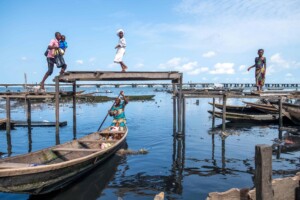Diane Davis, Charles Dyer Norton Professor of Regional Planning and Urbanism, and Gareth Doherty, Associate Professor of Landscape Architecture and Director of the Master in Landscape Architecture Program, are among the recipients of the first grants awarded by Harvard’s Salata Institute for Climate and Sustainability. The awarded grants will tackle a range of climate change challenges, seeking to reduce future warming and assist those whose lives already have been affected by the crisis.
The grants to five research clusters will provide more than $8.1 million over three years to projects that bring together 30 faculty members from disciplines spanning Harvard Law School, Harvard Business School, the Harvard T.H. Chan School of Public Health, Harvard Medical School, Harvard Kennedy School, the Graduate School of Design, the John A. Paulson School of Engineering and Applied Sciences, and the Faculty of Arts and Sciences.
Diane Davis will take part in “Strengthening Communities,” a cluster organized to probe the social costs and benefits of changes in the energy system, and propose concrete ways communities, firms, and governments to help them navigate the wide range of fiscal, legal, regulatory, and development choices they face. The cluster focuses on two principal social challenges, which occur at multiple scales: the disruptions and opportunities arising from the adoption of new technologies, including dislocations as communities move away from fossil fuels or shift to a new energy mix.

Gareth Doherty will contribute to “Climate Adaptation in the Gulf of Guinea,” a research team focusing on coastal communities in Abidjan, Accra, and Lagos that are at risk from sea-level rise and compounding impacts, such as flooding, saltwater intrusion, storm surge, and coastal erosion. In these communities, and other coastal ones in Africa, sea-level rise is jeopardizing livelihoods, impeding tourism, and damaging traditional fishing grounds. The goal of the project, therefore, is to identify viable climate adaptation strategies.
Throughout the week of May 8th Harvard Schools, centers, and student groups will host an array of climate events with leading experts, including the Salata Institute’s first annual symposium on May 9th.
The Salata Institute launched in June and is supported by a $200 million gift from Melanie and Jean Salata. During the institute’s opening symposium in October, Jean Salata said he’s confident that the world will meet the climate change challenge, though the work will be difficult and require contributions from all aspects of society.